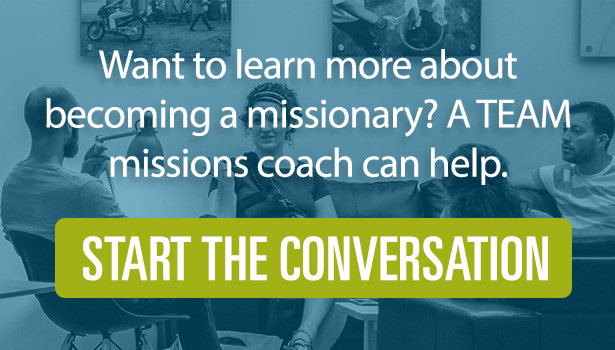
Becoming a Missionary
How to Weigh Missions Agencies Against Each Other
March 23, 2020
by Jordan

There are hundreds of missions agencies out there, and for good reason. People are diverse, cultures are vast, and denominations differ. Yet it can be overwhelming for the would-be missionary. How do you choose between missions agencies when multiple ones seem right? Or when all of the options have a flaw? Or when each agency can only offer you part of your vision?
Part of my role as a TEAM missions coach is to help potential missionaries discern which missions agency is best for them. Sometimes the choice seems obvious, but it’s often a matter of weighing pros and cons between several great organizations. These are my tips for narrowing down your options and making the right choice.
Underlying all these ideas is the deep need to be in prayer and constant communion with our Lord. The decision to enter into an area of the world where the church is growing, not very present, or doesn’t even have a Bible in their native tongue will bring elements of spiritual warfare. Because of this, every potential missionary needs to start practicing communion with God before they go.
So you’ve done your research, narrowed it down to a few missions agencies, but how ultimately do you choose between missions agencies?
Know Yourself
In weighing the mission agency decision, you need to think about what will aid the longevity of your ministry. Too often missionaries burn out and come home. Missions teams break apart, and ministries die because of conflict on teams. Sometimes missionaries reach their ceiling of potential in their missions agency and aren’t sure where to go from there.
How do you discern which agency will best help you in the long haul? To do this, you need to know yourself first.
Spend some time processing your past ministry experience and dreaming about your future goals. Think through when you’ve felt on fire for God, and times when you have felt distant.
Make sure to bring your church leaders in on this process. It can feel like you’re under a microscope, but it is important to be vulnerable, allow others to know your strengths and weaknesses. They may see things you can’t, and they have unique wisdom and knowledge to pour into your decision-making process. Trust them in helping you choose between missions agencies.
As a missions coach I help people in this process. Here are some questions I ask:
How do you function on a team? Do you take on leadership roles, or do you thrive in following? Is there a leadership style you thrive under? Or feel stifled by? Do you have entrepreneurial dreams, or are you hoping to maintain the stability and longevity of an established ministry? Are there personalities you don’t jive with? When do you feel most alive? Is there an area you feel weak?

Knowing yourself — your areas of strength and areas of weakness — will help you wisely choose between missions agencies.
Decide Your Non-Negotiables
In these discernment conversations I have, patterns come up in non-negotiables, and there’s few common ones I’d like to share with you.
Theological alignment is a must. When you are planting a church, you need unity and cohesion in the beliefs and doctrine that will be taught at the church. Of course, believers may vary on a wide variety of secondary issues. However, you need to be sure that your core beliefs align, and it may help to discuss how you’ll handle certain secondary issues.
Member Care is crucial to longevity in missions. Does the mission agency have resources and help a growing family? Or someone on staff specifically for missionary kids? What happens if there’s a crisis around the world, will the agency know how to take care of their missionaries? Are their people available to counsel? Are there opportunities for missionaries to be refreshed?
Also, make sure your missions agency will provide training and opportunities for further learning. You want to know that the team you are joining is competent at what it does, and you want to be competent when joining the team. But what if something comes up, and you realize you need further training and schooling to better minister to the people God’s put before you? Make sure your agency offers opportunities to continue to grow and develop.
Go Deeper with Each Missions Agency
Have conversations with the agency representatives, and listen to the questions they ask you in interviews. This points to the values of the missions agency.
Consider going on a short-term trip or vision trip with the missions agency. Actually spend time with them, in their training and on one of their teams. A short-term trip is almost like dating before getting married. You take the time to get to know the person before making a long-term commitment.
As you dive deeper, you may discover new non-negotiables to add to your list. You may realize other things are less important than you thought. Either way, the process will help you refine your search — or decide that you’ve found the right missions agency already.
And it will serve you and your ministry well to know are committed to each other, in all the strengths and weaknesses.
Give the Decision to God
Finally, and most importantly, submit all of this to the Lord in prayer. If you believe that God really is the Lord of the harvest and He is in charge of sending new workers out, then trust in Him to guide you.
Take the time now to commune with the Lord in prayer and Scripture studying. Deep communion with God will allow you to hear the Holy Spirit and be obedient to His promptings. Be dependent on God and His leading you through the Holy Spirit. Trust Him with your call to missions, and trust Him to lead you to the right missions agency.
Are you interested in missions? Talk to a TEAM missions coach today to see if TEAM might be a good missions agency for you! Our missions coaches are committed to helping you find the best missions agency for you — even if it’s not us. Click here to start the conversation!
Related articles


